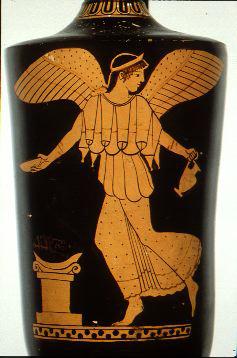





Frequently Asked Questions about the Ancient Olympic Games
- Where did the Olympic games come from?
- Why were they held at Olympia?
- Were there other contests like the Olympics?
- Who could compete in the Olympics?
- Were women allowed at the Olympics?
- How were the athletes trained?
- What prizes did Olympic victors get?
- Who were the Olympic judges?
- What was the penalty for cheating?
- Where did the marathon come from?
- When did the ancient games begin and when did they end?
What prizes did Olympic victors get?

Youth, detail of head and shoulders
Photograph by Maria Daniels, courtesy of the University Museums, University of Mississippi
A victor received a crown made from olive leaves, and was entitled to have a statue of himself set up at Olympia.
Although he did not receive money at the Olympics, the victor was treated much like a modern sports celebrity by his home city. His success increased the fame and reputation of his community in the Greek world. It was common for victors to receive benefits such as having all their meals at public expense or front-row seats at the theater and other public festivals. One city even built a private gym for their Olympic wrestling champion to exercise in.

Main panel: Nike holding phiale and oinochoe, altar at left
Photograph by Maria Daniels, courtesy of Harvard University Art Museums
When an Olympic victor from Crotona re-entered the Games as a native of Syracuse (to impress the ruler of Syracuse) and won both times, the citizens of Crotona were so angry about being robbed of their rightful victories that they tore down the athlete's statue in their city and condemned his house to be a prison.
To read more about these topics, see Further Resources.
This exhibit is a subset of materials from the Perseus Project database and is copyrighted. Please send us your comments.